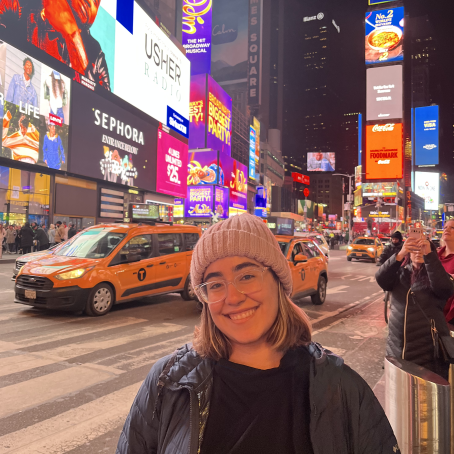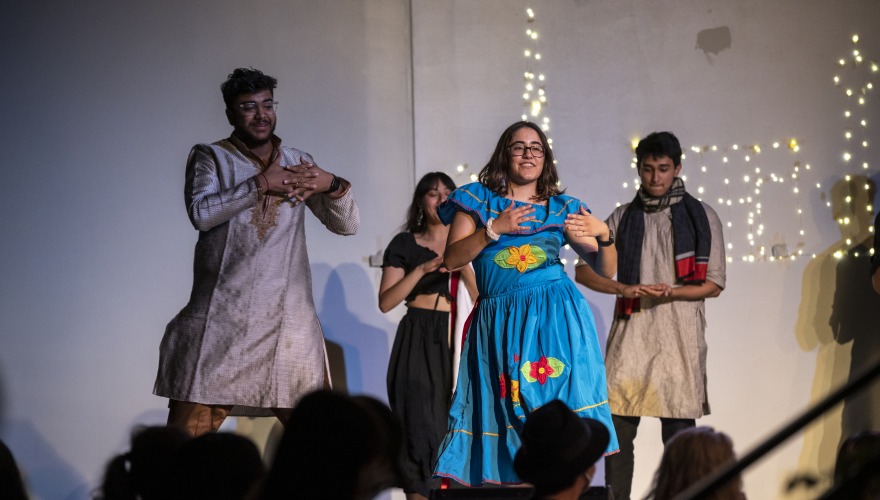Digital Technology in the Field of Neuropsychology

Andrea Suazo Rivas ’24 has known she wanted to be a psychologist ever since she watched a documentary about the brain and listened to brain experts explain their investigations on-screen. She remembered thinking that she wanted to pursue their job.
Now, the psychology major from Honduras is conducting her own research in digital cognitive assessment surveys. Her project is supported by a research grant she received through Psi Chi, the International Honor Society in Psychology.
Suazo Rivas was inspired to survey clinicians and researchers experienced in digital cognitive assessment tools after working at the Nathan S. Kline Institute for Psychiatric Research (NKI) in New York, where she interned during the summer before both her third and fourth year. More specifically, her research team focused on neurocognition and changes throughout aging.
“Older people are sensitive to cognitive decline: memory loss, difficulties with speech, and executive dysfunction. Having good assessments is important for degenerative disorders — those that can measure when someone is starting to decline and whether the decline is a symptom of a dementia or normal aging.”
During her internship, Suazo Rivas witnessed her research team transition from paper-and-pen-based assessments to digital tools — such as computers, phones, iPads, and augmented reality equipment like virtual headsets.
The following fall, she applied for several grants, officially receiving the Psi Chi grant in December. Shortly after, she budgeted the funds for data analysis software, a huge resource for quantifying and coding open-ended responses she would receive from her research survey. Interestingly, Suazo Rivas described the field of neuropsychology, which has traditionally used physical methods to record cognitive performances, as being “on the fence” regarding digital assessments.

“My project surveys psychologists and their attitudes and perceptions of the challenges and benefits of all things digital. It’s important to have their opinions and their input when you develop these assessments,” she says.
So far, her survey has been sent out to neuropsychologists with the help of Anna MacKay-Brandt, Ph.D., a mentor from the Nathan Kline Institute. With funding support from the Center for Career, Life, and Services (CLS), Suazo Rivas promoted the survey at the International Neuropsychological Society conference back in February (the CLS also funded both internships at the NKI during her two years there).
“This idea of digital assessments being better for diagnoses and testing people with cognitive defects was really interesting to me,” says Suazo Rivas, “and interesting to see that the field as a whole is not adopting digital [methods of assessment]. So, I wanted to investigate that. What can we prove about digital tools? What are researchers’ opinions? Do they have any improvements to suggest? This hasn’t been formally studied so people are saying, ‘neuropsychology isn’t adopting technology…why?’”
The hardest part of the project, she noted, was reaching out to people to participate, but she’s had the support of powerhouse MacKay-Brandt, who Suazo Rivas says was a huge encouragement. “For me, it was a little scary as an undergraduate to go up to people with professional experience. I’m not paying them for their answers, so it’s really about gaining that self-confidence to approach people.”
Her research has also fostered relationships with Grinnellians in the field and illuminated her future prospects. “Because of my study, I got connected to a Grinnell alum who is a neuropsychologist. She saw my study and was like ‘Oh, a Grinnell student!’ They were happy to extend advice about applying to grad school and applying to jobs.” Now, Suazo Rivas is positive she’ll be pursuing neuropsychology in the future.
“I wasn’t sure if I liked doing research because I wanted to go clinical,” she remarked. “I knew I wanted to work with patients but to do that in neuropsychology I would need a Ph.D. But I wasn’t sure if I was committed to that research part. But now that I’ve done my own research, I find it exciting.” With the additional support of Psychology Professor David Lopatto, she will be wrapping up her research before she graduates this May.
Suazo Rivas, who was born in Honduras, has thought about how her work could apply to her home country, as well. “In some ways and some ways not,” she says. “Digital technology makes things more accessible. But Honduras and countries in Latin America in general don’t have as much access to technology, and so that is also a barrier.”
Suazo Rivas currently works with a student team for the Psychology Student Educational Policy Committee (SEPC), is a senior interviewer at the admissions office, and helps plan events with multicultural organizations on campus, such as the upcoming April 20th Carnival — a collaboration between the Student Organization of Latines, the Brazilian Student Association, and the African Caribbean Student Union (ACSU).

About the Psi Chi Undergraduate Grants
Psi Chi Grants support Psi Chi undergraduate members by offering financial assistance to student members who will serve as first author and project director. Undergraduate research grants cover direct costs stemming from students’ original, empirical research projects (except for stipends, salary, tuition, research assistants, etc.). Students are chosen based on applications rooted in commitment and competency to psychology’s best research practices. The funds also help to introduce recipients to the process of grant-writing and managing research grants. Each funding round allocated $25,000 for research grants, totaling $75,000 in funding annually. Students experiencing financial hardships may apply for an additional stipend for living and research-related travel expenses. To read more about Psi Chi’s undergraduate research grants, visit the Psi Chi website.


